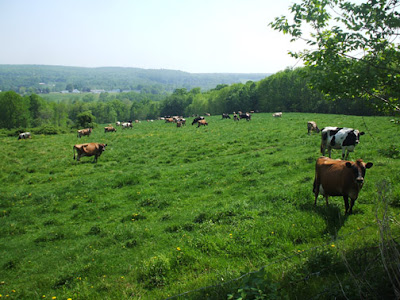
Guest blogger
Hannah Gay is a local woman who graduated from our high school a few years ago and, after college, is now teaching at a middle school in Crownpoint, New Mexico. Periodically, she sends us a column. I wish she'd write more often, if she could keep up the level of inspiration and quality you're about to see. Mostly, I wish my granddaughters would have her for English when they reach middle school. I asked her to let me post her latest column here because it's not at all the sort of thing I would, or could, write, but I sure liked it a lot.
They say Chicago is the windy city. They, whoever “they” may be, have never been to Crownpoint.
Spring is wind season, and the gusts here have, at times, exceeded the highways’ speed limits.
Desert sand blows into coughing mouths and keeping the windows open, despite the summertime temperatures, becomes risky should one wish to refrain from spending an hour picking dirt out of a computer’s keyboard.
Occasionally, a freak hail or sleetstorm will accompany the blustery wonder.
Ten minutes later, peace temporarily arrives and I find myself cheerily washing dishes and gazing out my kitchen window into yet another one of the most beautiful sunsets in the world, made possible in part by the organic smog of fine dust lingering in the air of the Navajo Reservation.
I hear there’s snow in Maine, and my mother left me pictures after her recent visit here of the trenches she dug in the March coat of white covering my hometown.
My friends in New York send me messages about monsoons, and a recent flight I was scheduled to take was canceled due to tornadoes in Dallas.
Strange weather, it seems, is everywhere.
Yet inside Room 3 in Crownpoint Middle School, things are unseasonably calm and in order.
I began school last fall wishing to do nothing other than lead my students toward publishing some kind of class anthology.
People told me to have high expectations for my students, to accept nothing less than what kids in more affluent areas would be producing.
Kids in a wealthy private school in Albuquerque had published an actual book; certainly my students and I could aspire toward that.
Yet in my first semester of teaching, overwhelmed by textbook methodology and the prescriptions of various supervisors, I temporarily forgot the bigger picture.
Then, as the frost began to disappear from early morning windshields and desert shrubs, so did my care to follow anything the books and authorities said.
Our state standardized test was over, and as a successful English major, I finally trusted myself to know what it took to be a successful reader and writer.
My kids are well on their way into creating an anthology of personal narratives, writing about everything from breaking their pinky in fourth grade to grandparents’ deaths to their first encounter with drugs on the reservation to a recent unexpected explosion in their science class.
Today we spent class trying to figure out if memoirs and personal narratives ever were really true non-fiction if they were written from memory, and we read and discussed excerpts from and articles about the controversy surrounding James Frey’s A Million Little Pieces.
We even got to watch and respond to a clip from Oprah. Tomorrow we’ll be discussing a Navajo memoir set around here that was similarly found to be fabricated (Nasdijj’s “The Blood Runs Like A River Through My Dreams”), and I am finally confident that my students are actually thinking and questioning the world in my classroom, not just memorizing and mastering sometimes irrelevant standards.
And with that, I’m starting, just a little bit, to feel at home here.
On Friday I could barely hear my principal speak at our weekly staff meeting, as the drums and singing of a small pow-wow happening in our gym drowned him out.
My art teacher, a Navajo herself, shouted jokingly to the darn Navajos to quiet down in school, and I had no self-consciousness laughing at her joke.
Yesterday about twenty of my girls arrived at school in traditional Navajo dress, with velvet skirts, yarn in their hair, handsewn moccasins and immaculate silver and turquoise jewelry.
It was a stark contrast to their usual KSwiss sneakers, blue jeans from Hot Topic and black hoodies.
They were going on a field trip to the Navajo Nation government in Window Rock, Arizona, and they were beautiful.
And for the first time, I felt comfortable gazing at their traditional dress, smiling that I knew the people inside those clothes, the girls who liked to listen to Godsmack or Akon and couldn’t figure out apostrophes and wouldn’t chew gum unless it was yellow.
I’m a Mainer by birth, and will never be a New Mexican, much less a Navajo. This is not my home, and I feel humbled every day how welcomed I am here and that I have such an opportunity to live on the beautiful reservation.
Yet I now secretly laugh at tourists who can’t figure out how to eat an unwrapped tamale as I used to laugh at people from away eating, or attempting to eat, a lobster back home.
The wind doesn’t bother me as much as it did in the fall, when it kept me up awake at night, kept me longing for the protection of my Maine woods.
Now I often fall asleep to its howling lullaby as I rest for yet another day in the life on the reservation and despite the violence of the weather outside, things feel a bit more peaceful all around.





















